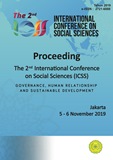FAMILY COPING STRATEGIES AND ITS IMPLICATION ON THE DEVELOPMENT OF CHILDREN WITH PHYSICHAL DISABILITY
Abstrak
Family coping strategies can be one important variable that can support the development of children with disabilities. Families with good / active coping strategies can provide a safe and comfortable environment for the development of children with disabilities. The purpose of this study is to find out 1). coping strategies of family strategies and the development of children with physical disabilities before applying the model; 2). a model for improving family coping strategies; 3). the coping strategies of family strategies and the development of a child's physical disability after applying the model. This research is an action research involving six children with physical disabilities, six mothers and three fathers. Data collection techniques use in-depth interviews, observation and focus group discussions. The results showed that the coping strategies of the family before applying the model were in the passive category of the seven aspects of copyng mechanisms and the development of children with physical disabilities experienced obstacles in several aspects of their development. Interventions to improve family coping strategies using family counseling and positive behavioral reinforcement techniques, the results indicate changes in family coping strategies in the active category and also changes in the development of children with physical disabilities. Family coping strategies are also influenced by the environment as a support system for families. Indonesia, which is rich in social capital such as mutual cooperation culture and strong kinship, is a variable that supports the increasing coping strategies of families with children with physical disabilities.Keywords: coping strategies, child development, physical disabilityReferensi
Bolyai, S., Sadler, L., Knafl, K.A., et al. (2003). Great expectations : a position description for parents as caregivers : Part 1. Pediatric Nursing, 29 (6), 457-461.
Carver, C.S. 1989.Assesing coping strategy : A Theoretically bassed approach. Journal of Personality and Social Psychology
Ernest T. Stinger (2007). Action Research. third Edition. USA. Sage Publication.
Harry Hikmat. (2010). Jumlah anak cacat di Indonesia. Antara News. http://antajawabarat.com.
Ho, K.M., & Keiley, M.K. (2003). Dealing eith denial : A systems approach for family professionals working with parents of individuals with multiple disabilities. The family Journal: Counseling and Therapy for Couples and Families, 11 (3), 239-247.
Lazarus, R.s. & Folkman, S.(1984). Stress, Appraisal and Coping. New York: Springler.
Miles, M & Huberman, A. (1994). Qualitative data analysis: an expanded sourcebook. 2 nd edn. USA: Sage Publication, Thousand Oaks, CA.
Newman. Barbara M and Philip R. (2006). Development through life. Ninth ed. USA: Thomson Wadsworth.
Pellegrino, L,M.D. (2007). Patterns in development and disability. Baltimore: Paul H. Brookes Publishing Co.
Piaget, J. (1990). The Child’s conceptionof the world. New York: Littlefield Adams Quality Paperbacks.
Rothman, Julliet. (2003). Social work practice across disability. Pearson education.
Santrock, J.W. (2006). Life-span development. Boston: McGraw-Hill.
……………… (2009). Children. Boston: McGraw-Hill.
Sarafino, Edward. P. (2001). Health psychology: New York: Bio-Psychosocial Interaction.
Skinner, B. F. (1987). Whatever happened to psychology as the sience of behavior ?. American Psychologist, 42, 780-786.
Somantri, Sutjihati. (2007). Psikologi Anak Luar Biasa. Bandung: PT. Refika Aditama.
Sugiyono. (2007). Memahami Penelitian Kualitatif. Bandung: Alfabeta
________. (2007). Metode Penelitian Kuantitatif Kualitatif dan R&D. Bandung:
Zastrow H. Charles and Kirst Ashman Karen K. (2004). Understanding human behavior and the social environment. USA: Thomson Learning Inc.


